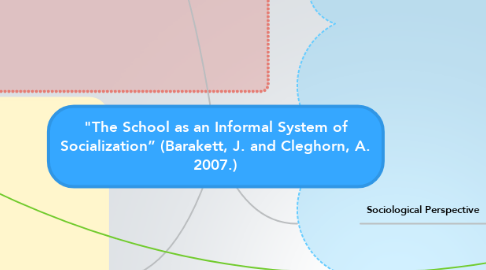
1. Historical Perspective
1.1. Older theoretical perspectives on the process of socialization, leading to our current perspectives.
1.1.1. Freud's Theory: Relies on biological factors to explain personal development. Each individual has an id: unconscious instincts, ego: recognizing id limits and the superego: the conscience.
1.1.2. Piaget's Theory: Human behaviour is the collaboration of environment and biological factors. Cognitive perspective is the development of thought and perceptions.
1.2. Schooling in Canada's past worked to maintain the power structure, social status quo and control. Moral and Political socialization worked into the educational system as society evolved.
1.2.1. Political Socialization: ex. the school system supporting and educating students of the structure of society and the current political perspective.
1.2.1.1. Lecture Example: Education and the school system are political acts. Although political socialization occurs within the classroom, teaching is not politically neutral. Teaching either conforms or becomes a beacon to discover change. (Chovanec, Lecture 2013).
1.2.2. Moral Socialization: instilling the values and ideas of society.
1.2.3. Lecture Example: Canada's past has worked to form the currently existing education system. In Canada's past, education was strictly run by the church and lessons could not deviate from this. Since only one perspective in a strict form was ideal, secondary socialization and the social learning theory created a population that learned only from this strict environment. Since then, we have worked to create more diverse and better learning environment. (Peters, Lecture 2013).
2. Sociological Perspective
2.1. Socialization: Complex, life-long learning process where one develops a sense of self and develops their social role.
2.1.1. Secondary Socialization: Social learning influenced by school institutions, peer groups and media.
2.1.1.1. Schools teach ideal values, skills and selected knowledge that are important to a well functioning society.
2.1.1.1.1. Much of what is learnt in school is not in the formal curriculum, it shows up in the hidden curriculum, where social norms and values are taught by a students experience in the classroom.
2.1.1.1.2. The school system can be considered to be society's normative system and instruct the ideal version of society's values (Durkheim, 1961).
2.1.1.2. "The elementary school, regarded in the light of its socialization function, is an agency which differentiates the school class broadly along a single continuum of achievement, the content of which is relative excellence in living up to the expectations imposed by the teacher as an agent of the adult society." (Parsons, 1967).
2.1.1.3. Peer group influence is an informal schooling process as many peer groups occur within school. Along with peer groups, popular culture brought in to the classroom woks to also affect the pedagogy of educators since it is always present in student culture.
2.1.1.4. Teacher education and how educators teach is influenced by the dominant ideology. The teacher transforms knowledge and works the efficiency of the classroom, so teacher education needs to work to compliment these important aspects of current educators.
2.1.2. Primary Socialization: Occurs within the family. Development of language, self identity, self control, cognitive skill learning and moral standards.
2.1.2.1. Personal Example: As a child, the development of my initial language and the introduction to my self identity came from my family, the main form of primary socialization. Although my parents worked to develop my moral standards, my school experience also worked to help me develop those values. School, as a form of secondary socialization, greatly influenced my opinion and skills to help me be a well functioning adult in society.
3. Philosophical Perspective
3.1. Currently Accepted Theoretical Perspectives
3.1.1. Social Learning Theory: Environmental factors surrounding the child and learning by imitating behaviours and values from the people they are in most contact with, such as educators in the school system.
3.1.2. Schutz's Theory: Intersubjectivity includes the knowledge accumulated by our experiences. These life experiences and common sense knowledge work to help us with situation interpretation and typification. (Schutz, 1973)
3.1.2.1. Tracking: formation of different ability groups within classrooms for better organization and special instruction to work with each learners need.
3.1.2.2. Teacher Typification: Teacher common sense knowledge on pupils. Constructed assessment of students to permit a measure of order.
3.1.2.2.1. Personal example: During my schooling experience, students were separated in different learning groups based on teacher typification and tracking. They did this to teach each student in the best form fit to their learning.
3.1.3. Mead's Theory: Human develops one's self by being reflective of the attitude of the significant other and taking on the role of the generalized other with attitudes of society. Individuals are socially constructed. (Mead, 1934).
3.1.3.1. Personal Example: In myself and in my peers, I can see where many personalities deviate from. Each individual personality is different, but they are reflective of their environments. Personally, I have been shaped by my family, my education and the experiences I have encountered. My experience relates closely to Mead's theory.
